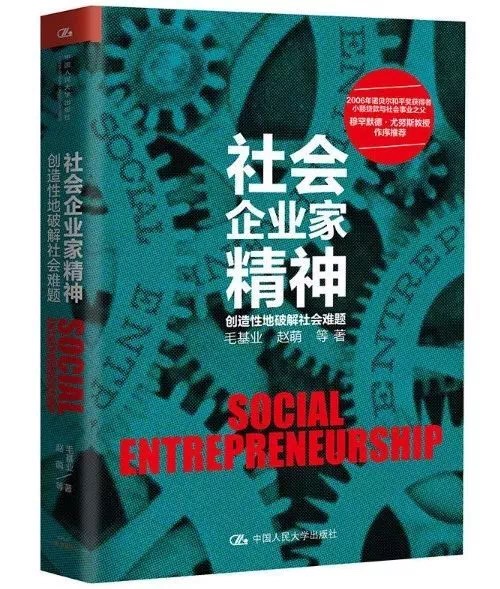Time:2018-07-27
Recently, the book Social Entrepreneurship has been published. Its authors include Prof. MAO Jiye, associate professor ZHAO Meng, and a dozen other faculty members from Renmin Business School and the Yunus Center for Social Business and Microfinance at Renmin University of China.
Over a span of 10 months, the authors visited ten social enterprises that play a leading role in their respective fields, and collected a large amount of valuable data from 70+ hours of both formal and informal interviews and dialogues. The social enterprises included this book provide innovative solutions to vital social problems. Most of them are pioneers in their respective fields.
The authors look to address two fundamental questions about social enterprises in China that have been very controversial over the years. First, what is social enterprise? This book proposes a framework that defines Chinese social enterprises based on social entrepreneurship, and includes ten case studies for justification. Second, who are the early starters with sizable operations and social impact? The book describes in detail some of the leading social enterprises in China.
The authors believe that over the years, the ten businesses have formed or have been shaping up promising business models that could substantially solve social problems on a sustained basis. In addition, the authors have found some clues in these enterprises that may help prevent the organizations from shifting away from their social commitments, or, in other words, from going back on their social mission in pursuit of financial revenue and profit. These clues include institutional design, decision-making, organizational culture, and behavioral pattern.
This book incorporates theoretical framework and management cases in discussions on social enterprise. It is aimed at a wide target audience. Practitioners will learn experience and lessons from the case studies. Academics can use the cases in different teaching contexts, and gain research inspirations from our framework and case studies. Policy makers, accreditation agencies, professional service providers, and institutional investors will learn to identify and evaluate promising social enterprises.
Click here for the authors’ profiles
MAO Jiye and ZHAO Meng
FOREWORD of the Book
I am pleased to see the release of this important scholarly work on social enterprise. I appreciate the hard and timely work by my colleagues at the Yunus Center for Social Business & Microfinance, Renmin University of China (YCRUC). This book makes an excellent effort to answer questions that I believe are critical for the current stage of social enterprise and social business development in China.
This book provides an appropriate and useful way of looking at what a social enterprise is fundamentally about. As I put 27 dollars in the hands of the poor people in rural Bangladesh more than 40 years ago, I was not offering financial support or teaching a business model, I was delivering my confidence in their inherent potential of pursuing an independent and better life. I was igniting their entrepreneurship.
Social enterprise is a broad umbrella concept within which there are many specific concepts. This book helpfully clarifies the differences and connections among these various concepts. I am sure this will help the readers in avoiding the confusion sometimes created by careless use of these terms, such as, social enterprise, social business, corporate social responsibility, B Corp and so forth. I see very often people use terms like social business and social enterprise inter-changeably because of lack of understanding of both. This book will be helpful in clarifying the differences and making readers appreciate what they are, and what they are not.
Enormous possibilities wait for us to guide the national and the global economy in social direction by applying these concepts in appropriate ways. There is over-whelming concurrence that the present personal profit centric economic structure is leading the world to massive social problems, particularly the problem of high-speed concentration of wealth in fewer and fewer hands. In order to undo this trend quickly we have to shift the economy in the social direction as fast as we can. This book presents the options we have to achieve this.
This work has become especially attractive because it is among the first of its kind to conduct in-depth case studies of outstanding Chinese social enterprises. It offers its views on their strengths and weaknesses, breakthroughs and struggles, convictions and concerns. This kind of knowledge is in great need both in China and worldwide.
I would like to applaud my academic colleagues at Renmin Business School for their contribution through this book in helping understand the updated landscape of social innovation in China. I give my best wishes to YCRUC and its partners in China for fixing their mission to substantially contribute in improving the capabilities, and social impact of the social enterprise and social business communities.
I hope social enterprises and social businesses will continue to grow in importance in the Chinese economy and become a major source of Chinese solutions for social problems in China and the world.
Professor Muhammad Yunus
Founder, Grameen Bank
Nobel Peace Prize Laureate 2006

RMBS made the Top-50 list of MBA,
EMBA and EE programs——The Financial Times
@Business School, Renmin University of China 京ICP备05066828号-1